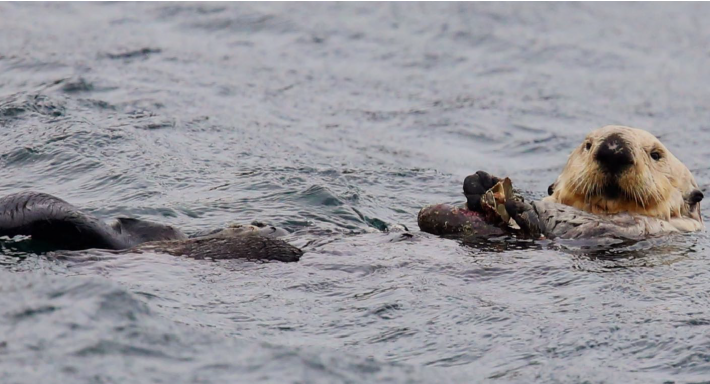Indigenous voices reveal key strategies for navigating the challenging return of sea otters
Simon Fraser University press release.
Research published in People and Nature explores how Indigenous peoples can better co-exist with recovering sea otter populations along the Northwest coast of America.

A new study highlighting the long-term relationships between Indigenous peoples and ocean resources reveals how coastal communities can improve their ability to coexist with recovering sea otter populations. The recovery of this notorious shellfish predator is triggering major changes in nearshore marine ecosystems impacting food security for many First Nations.
Researchers from SFU initiated the “Coastal Voices” collaboration, a partnership with Indigenous leaders and knowledge holders representing 19 First Nations and Tribes from Alaska to British Columbia. Recognizing that Indigenous perspectives were largely absent from dialogues about sea otter recovery and management, this collaboration sought to change this.
“Our people actively managed a balanced relationship with sea otters for millennia,” says co-author, and Haida matriarch Kii’iljuus (Barbara Wilson). “Our work with Coastal Voices and this study helps show how those rights and knowledge need to be recognized and part of contemporary sea otter management.”
Sea otters were hunted to near extinction during the fur trade of the mid-1800s. But today, the recovery of sea otters along the northwest coast of North America presents a challenge for coastal communities because both otters and humans like to eat shellfish, such as sea urchins, crabs, clams and abalone.
While there is plenty of research and knowledge about how sea otter recovery greatly reduces shellfish abundance or expands kelp forests, almost no reports or studies focus on how First Nations and Tribes are impacted, or adapting to the ways that sea otters threaten their food security, cultural traditions, and livelihoods.
“Rather than just focus on the negative impacts, our study looks ahead and seeks solutions” says SFU lead author Dr. Jenn Burt. “We documented Indigenous peoples’ perspectives which illuminated key strategies to help improve sea otter management and overall coexistence with sea otters.”
The study used a two-stage approach. The collaborative first hosted a large workshop gathering where participants identified social and ecological conditions that could improve Indigenous peoples’ ability to adapt to sea otter recovery. Then a small group of researchers and Hereditary Chiefs visited two remote communities with the longest experience of sea otter recovery – the Alaska Sugpiaq Tribes of Port Graham/Nanwalek and the Kyuquot/Chekleset First Nations in B.C. During their visits they conducted survey-interviews to assess “which conditions most enable adaptation to sea otters, and why?”
“Our findings reveal four key strategies that Indigenous communities perceive as critical to facilitating the coexistence of people and sea otters,” says Burt. These include 1) strengthening Indigenous governance authority and shared decision-making in marine resource management, 2) establishing locally-designed adaptive co-management plans for sea otters, 3) incorporating Indigenous knowledge and practices in sea otter management plans, and 4) building networks and forums for communities to share sea otter information and experiences.
“The differences in survey responses between the Sugpiaq and Kyuquot/Chekleset were revealing. They illustrate how both sea otter recovery time scales and different legislative frameworks to sea otter governance and management can influence people’s perspectives and attitudes toward otters.”
Dr. Anne Salomon is an Associate Professor the SFU’s School of Resource and Environmental Management, a study co-author and co-lead of the Coastal Voices research partnership. She remarks that “this research reveals that enhancing Indigenous people’s ability to coexist with sea otters will require a transformation in the current governance of fisheries and marine spaces in Canada if we are to navigate towards a system that is more ecologically sustainable and socially just.”
Fortunately, this study concludes that while such transformations are challenging, they are possible. The authors provide evidence to show that adaptive governance and Indigenous comanagement of marine mammals exist in other coastal regions in northern Canada and the US. They also suggest that increasing Indigenous leadership and Canadian government commitments to Reconciliation may provide opportunities for new approaches and more collaborative marine resource management.
Skil Hiilans (Allan Davidson), a Haida Hereditary Chief and study co-author agrees there is hope. “Our ancestors had a way of managing our relationship with the sea otters, they had a place in the ecosystem. With today’s laws there is a delicate balance and Indigenous people need to be a part of the discussion regarding their management.”
You can read the article for free here:
, , , et al. Enabling coexistence: Navigating predator‐induced regime shifts in human‐ocean systems. People Nat. 2020; 00: 1– 18. https://doi.org/10.1002/pan3.10090
Media contact:
Jenn Burt (North Vancouver resident), 778-863-2878, jenn.burt@gmail.com
Like what we stand for?
Support our mission and help develop the next generation of ecologists by donating to the British Ecological Society.